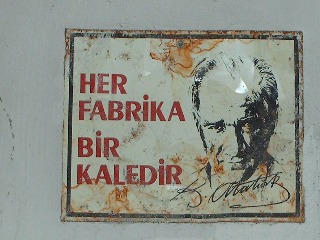What the Columnists Say
Prime Minister Erdoğan’s leadership style is the subject of many comments. Eyüp Can in Radikal claims that Erdoğan wants to become Turkey’s second founding father after Atatürk. He observes that Turkey does not need another “father” who would rule with an iron fist, and that the country is too diverse for such an attempt to succeed. Murat Belge in Taraf, meanwhile, points to the societal foundations of Erdoğan’s ambitions. He suggests that the lack of democratic culture among the rural bourgeoisie that is the main force behind AKP sustains the drive to impose a majoritarian system. Meanwhile, Yüksel Taşkın in Taraf sees hope emerging that the urban bourgeoisie – the Kemalists – is going to promote democratic values, as this would conform to its class interests.
The Ergenekon Releases and Prospects for the Rule of Law in Turkey
By Gareth Jenkins (vol. 7, no. 5 of the Turkey Analyst)
Recent amendments to the Turkish Criminal Code have resulted in the provisional release of more than 30 of the defendants in the notorious Ergenekon court case. In the new political climate created by the power struggle between Prime Minister Recep Tayyip Erdoğan and the followers of the exiled Islamic preacher Fethullah Gülen, those released appear unlikely to have to return to prison. Nevertheless, even if they eventually all collapse, the repercussions of Ergenekon and the other politically motivated cases spawned by the Gülen Movement are likely to haunt Turkey for years to come.
Turkey at 90: Capitalist Development has Determined the Political Journey of the Republic
By Halil M. Karaveli (vol. 6, no. 20 of the Turkey Analyst)
Capitalism is the key to understand the political journey of the Turkish republic. Capitalist development explains the transition to multiparty democracy, the military coups, and most lately the ascent of Muslim conservatives to power. But the Justice and Development Party (AKP) has ceased to be a vehicle of capitalist development as it has increasingly veered toward a conservatism that does not provide for the needs of advanced capitalism. If the ninety years of republican history is any guide, then Turkish capitalism can be expected to produce another political remedy to its predicament.

Revolution and Counter-Revolution: Kemalism, the AKP and Turkey at 90
By Gareth Jenkins (vol. 6, no. 20 of the Turkey Analyst)
Ninety years after its foundation on October 29, 1923, the Turkish Republic is already radically different to how its founder, Mustafa Kemal Atatürk (1881-1938), intended. More change seems inevitable. Since it first took office in November 2002, the Justice and Development Party (AKP) has gradually dismantled Atatürk’s ideological legacy. In its place, the AKP has introduced not a pluralistic democracy but a new form of authoritarianism.

How to Package a Democracy?
By Burak Bilgehan Özpek (vol. 6, no. 19 of the Turkey Analyst)
In traditional Turkish bazaars, salesmen ask the same question if you have purchased a precious good: Do you want me to package this? This question actually aims to find the answer whether the good is going to be used by the buyer or if it is intended to be presented as a gift. Thus, the word “package” acquires a new meaning. It refers to a cover and it is applied to estheticize a good, which is presented as a gift. Such a discourse analysis in fact helps us understand why the government of the Justice and Development Party (AK Party) has used the word “package” in promoting its democratization reforms. Yet measured against liberal principles and expectations, the democratization package makes little or no contribution to the liberalization of Turkey.





